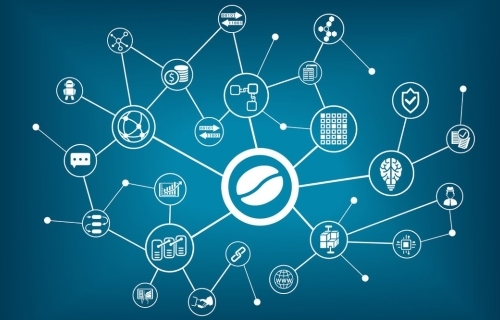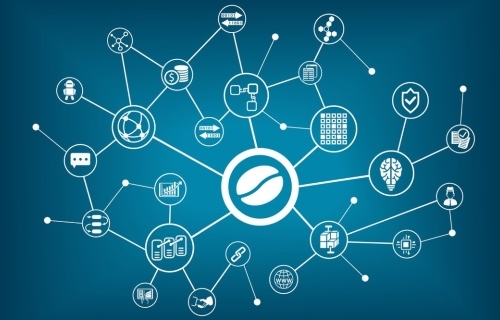


The vast swathes of Africa’s fertile lands may ultimately prove a central arena for the ground-up development of innovative digital infrastructure and green energy projects. Recent pivotal moments in African trade, such as the African Continental Free Trade Agreement, are setting the table for an environment conducive to rapid growth, where both energy and financial infrastructure are a primary focus.
Africa’s untapped economic potential is no secret. The continent’s population has soared past more than 1.3 billion, which accounts for roughly 17% of the world’s population and is mostly comprised of young people, with two-thirds of the population below the age of 24.
Such a bulge in the youth of Africa has helped fuel the fastest-growing mobile market in the world, but one that still lacks a robust financial infrastructure. Despite the ubiquity of mobile phones (specifically Nokia), only 6% of Africans make payments with a mobile device.
But that could all change soon.
The opportunity for Africa lies directly with the ability to potentially leapfrog an entire generation of financial and energy infrastructure — a luxury that countries in the Western Hemisphere lack. And the world is taking notice.
Twitter CEO Jack Dorsey was recently in mainstream headlines following an extended visit to Africa, after which, he announced that he would be returning for three to six months in mid-2020. The excitement stirred by his statement centered on his ongoing work with his payments company Square and its relatively new venture oriented on Bitcoin — Square Crypto.
Square Crypto is focusing on Bitcoin payment and investment solutions for mobile users and has garnered some impressive revenue in 2019. However, those results have largely been confined to the U.S. — something Dorsey is seeking to change. His temporary move to Africa will likely encompass an in-depth exploration of how to improve access to financial services and assets such as Bitcoin.
According to the African Development Bank report, “Financial Inclusion in Africa,” the leading prohibitive factor in more robust financial infrastructure is inadequate access to financial services.
The pieces to the puzzle for improving access are available, though. And it is precisely where Africa can break free of outdated systems like SWIFT and payment processors replete with trust issues and high fees. Blockchain firms focusing on instant, low-cost payments have subsequently swooped in at the opportunity to craft a new kind of financial infrastructure from its foundation.
Payment systems relying on blockchains can bypass conventional obstacles, embedding themselves directly into the hands of Africa’s more than 456 million mobile users. Should Square Crypto expand its operations to cover the populous regions of Africa that Dorsey has hinted as the first in line for Bitcoin development (such as Nigeria), then direct access to Bitcoin investing, Square Crypto, and payment rails will be at the fingertips of more than 350 million unbanked adults.
Recent research indicates that Nigerians are willing to take drastic discounts on Bitcoin purchases using the Paxful exchange primarily to circumvent remittance services like Western Union and the restrictive banking infrastructure in Nigeria. Using gift cards and Bitcoin, users can diminish remittance times and avoid capital controls. According to researcher Matt Ahlborg:
“The entire remittance process can be completed in 20–30 minutes with the end result of local Nigerian currency arriving to the family member’s bank account.”
The property rights afforded by Bitcoin could also have an outsized impact on long-term economic repercussions, unlocking trillions in dead capital. More capital leads to more infrastructure investment, which becomes a positive feedback loop for the broader African economy.
And some of that capital is already making its way into major infrastructure projects.
One of the most high-profile infrastructure developments of 2019 came out of South Africa, where Meridian Economics proposed an $11 billion green energy initiative in the African nation. Funded by development finance and private institutions, the massive project’s undertaking would include lending money to the Eksom state utility provider on the condition that it increases the pace of coal plant closures and injects cash into renewables research and development.
The move coincides with a growing influence by China in Eastern Africa, which has been pouring money into building transportation and energy infrastructure. Today, China is the largest financier of Africa’s infrastructure.
The takeaway is that there is palpable interest in investing vast sums into Africa’s development, and blockchain technology is a common thread in many instances.
For example, the President of China, Xi Jinping, detailed a planned push to improve and apply blockchain technology to practical uses in everything ranging from data sharing to industrial innovation.
Although China’s position on renewables is still up for debate, the technological sentiment has been reflected in a flurry of projects implementing blockchain-based solutions that can make green energy sources a reality.
For instance, Rolls Royce has invested 5 million euros ($5.6 million) into a blockchain-oriented Microgrid Validation Center that strives to reduce CO2 emissions, tinker with various microgrid models, and apply them to the real world. The initiative mirrors similar attempts to test the viability of microgrids in suburbs and cities, with the idea making its way into Africa.
Energy demands in Africa far exceed supply, especially in countries like Nigeria. As a result, microgrids have become an increasingly appealing option for people who do not have access to main electrical grids, mostly living in rural areas, by using solar panels. Blockchains help to ease the transaction costs of such microgrid marketplaces, where people can buy and sell excess energy using mobile applications.
But most of the marked shifts in Africa’s energy production will likely come from revamping primary electrical grids.
Blockchains can help manage the excess waste of electricity, ease regulatory moats via more distributed systems, and create regional markets for the energy chain. For example, in the United Kingdom, EDF Energy and U.K. Power Reserve have already traded energy market capacity obligations on the Electron blockchain platform.
In the context of Africa, governments can allocate renewable energy resources more efficiently, building national systems from the ground up with reduced costs. This overcomes one of the main issues with renewable energy sources — their high rates of energy curtailment. More efficient markets mean that less energy is accidentally (or deliberately) curtailed, making green energy ROI more appealing when compared with its fossil fuel counterparts.
Both blockchain technology and Africa’s economic development may be in their nascent phases, but the opportunity is unmistakable.
Blockchains can become a tool for the continent to bypass some of the inefficiencies plaguing the conventional financial system and collateral effects of the post-industrial revolution’s reliance on fossil fuels.
The impact of blockchain on supply chains in primary industries like agriculture and mining will ultimately create a pan-African ecosystem of smart infrastructure. The efficiencies this creates will be further improved by AI-driven solutions and mesh networks of IoT applications. In turn, this will define the how, what, where of African infrastructure.
The views, thoughts and opinions expressed here are the author’s alone
By Chris Cleverly
https://cointelegraph.com/news/unpacking-the-potential-of-blockchain-and-infrastructure-in-africa
